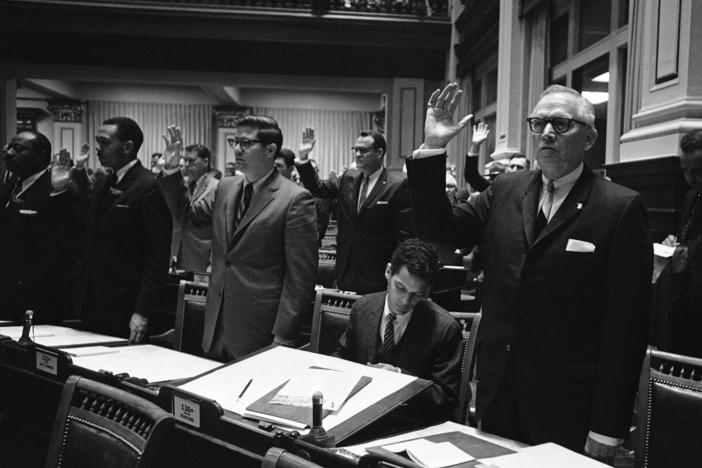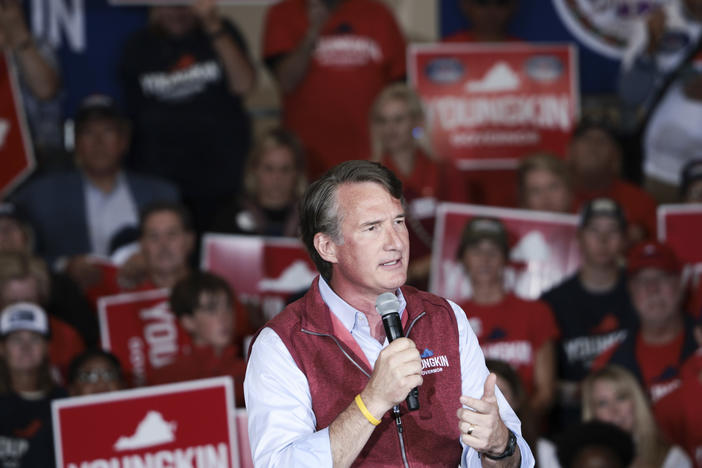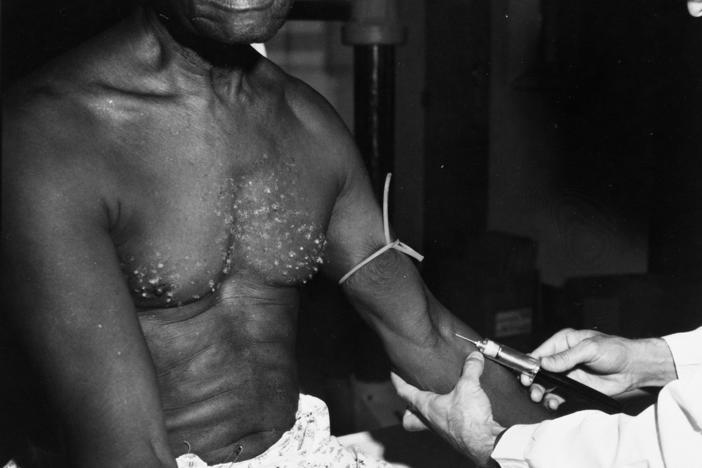Section Branding
Header Content
Rep. Ruiz: Vaccinating Food And Farm Workers Requires An 'Active, Concerted Effort'
Primary Content
Congressional Hispanic Caucus Chair Rep. Raul Ruiz, D-Calif., says expanding vaccine distribution in key industries is one of many steps to inoculating Latinos and other hard-hit communities.
Transcript
AUDIE CORNISH, HOST:
On that front, we're also seeing some improvement. Over the past week, the U.S. averaged 1.3 million shots a day. There is still a long way to go. More than 90% of the country has not yet gotten a single dose.
MARY LOUISE KELLY, HOST:
Which brings us to the alarm the Congressional Hispanic Caucus sounded this week over how few Latinos are getting vaccinated. In a letter to the National Governors Association, the caucus pleaded with state leaders to prioritize food and agriculture workers in the rollout. And they made an urgent case. Latinos make up more than a third of the workforce in those industries, but nearly three-quarters of confirmed coronavirus cases. Congressman Raul Ruiz of California is chair of the caucus. I asked him what prompted the letter to governors now.
RAUL RUIZ: There are some states that have not started vaccinating, for example, farmworkers. And then, even within states, some counties have prioritized farmworkers, but other counties haven't. Now, the other barrier in this is that if they have, for example, farmworkers, agricultural workers, food supply industry workers on paper, they are disproportionately not receiving allocations of vaccines or the method of opening up vaccines to them do not work.
For example, here in my own district, many don't have Internet at all. So how are they going to make their appointments online? Furthermore, they don't have a car to be driving to these vaccination sites. And then, a lot of the information is in English and not in a language that will help them understand and empower them to navigate the system.
KELLY: That's interesting because I was going to ask what else you believe needs to be done to try to fix this. I'm speaking to you from Washington, D.C., which is one of, I'm sure, a number of places that are prioritizing certain ZIP codes where COVID rates are higher and saying those people are going to go to the front of the line. It sounds like you would say, great, but that only get you so far if, again, people can't go online and see that their ZIP code is prioritized and get an appointment.
RUIZ: Yeah, that's absolutely true. So one is we need to measure equity. We need to mandate that all counties and all providers document who they're giving the vaccine to so that we can understand where we have inequity issues and the mismatch between the high burden of disease and illness from COVID and the amount of vaccines that they're receiving. Second, we have to ensure, for example, that when the administration starts to deliver the vaccine directly to retail pharmacies, that the retail pharmacies in those hardest hit communities are the ones prioritize offering the vaccine. Finally, we need to ensure that vaccine goes towards - directly from the federal government to the FQHCs and community health centers.
Now, how do you put the vaccine in an individual's arm is the whole other issue. Look, I'm an emergency medicine physician. And I have been, during COVID, going to farmworker communities, to the homeless, administering tests and just recently went to a worksite for farmworkers to help administer vaccines and then go out into the fields to educate the farmworkers, to correct the misinformation about the vaccine and to encourage them to get it.
KELLY: Give us a sense of what type things you are hearing when you're out and about and trying to talk to people. Are people - do they want the vaccine or is there some hesitancy?
RUIZ: Well, there is some hesitancy because of the misinformation that they get from sometimes social media or the rumors that they hear that the vaccine is going to make them sick with COVID. Two, they're concerned it doesn't work. Three, there're concerns about the costs. Four, some of the undocumenteds are concerned about whether or not they need to register and put their, you know, name somewhere. And so there's a lot of this misinformation or concerns from farmworkers.
And so the important part is that the messenger has to be someone who's trusted. I am the son of farmworkers. I grew up in the community. And I have spent a lot of time out in the fields working as a physician, public health promoter. I'm a messenger that they trust.
KELLY: Yeah, but you can't be everywhere, so what's the answer.
RUIZ: We also need the local physicians, and we need the priests and pastors and faith-based leaders to go out and to communicate this. Now, another source of trusted messengers are the schools, right? The parents trust their children's teachers. And so the youth in the Hispanic community plays a very vital role, too. Oftentimes, the youth are the ones that are up to date with the information. And they go home, and they educate their grandparents, their parents and their uncles. And so partnering with local communities is key.
KELLY: To circle back to that question of - that if you're trying to get shots into people's arms, you need to get the shots to where the people are, would you like to see vaccination sites set up, say, at meatpacking plants where there are large numbers of Latino workers or on some of these farms that you're talking about?
RUIZ: Yes, absolutely. I think that that has to be a very key component. If the workplace is the site of risk, then we need to go to the workplace to minimize and mitigate that risk. That is smart public health. There needs to be partnerships with the industries that has the high-risk essential workforce to inoculate their workers at the workplace, which means that they need protected time to go get the vaccine. These programs won't work if growers don't allow the time for their workers to go to the vaccine clinic and also provide transportation.
KELLY: That is Representative Raul Ruiz, chairman of the Congressional Hispanic Caucus. Congressman, thanks for joining us.
RUIZ: Thank you. It's my pleasure.
KELLY: And elsewhere in the show, we look at vaccine disparities around the world. Transcript provided by NPR, Copyright NPR.
Bottom Content



